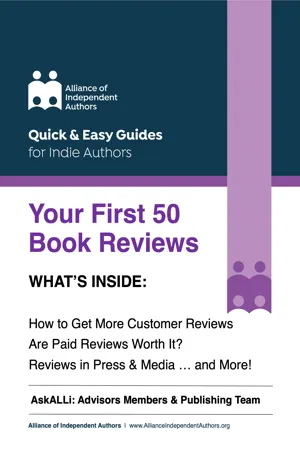When learning any new skill or practice, adopting the most effective mindset is key. As an indie author, you are an author-publisher, which means you are juggling more than one mindset. You need to be an inner-directed writer, in touch with your innermost thoughts, feelings and ideas and able to hone them into words. And you also need to be an outer-directed publisher, in touch with what readers need and want and how to best encourage them to buy and read your books.
As a writer, you want to produce the best books you can produce. As a publisher, you want to ensure that prospective readers know how good the books are so they will want to buy and read them. You also need to ensure that all strategies to get more reviews for your books are ethical and not misleading—fair to readers, other writers and other players in the bookselling ecosystem, who must not be misled by our natural desire to receive good reviews.
Internalizing this double-mindset will make the strategies in this book easier to accomplish.
Make it your mission to motivate your readers to review your books. Once you do, reviews will start to appear. What’s more, you will become less “attached” to the content of reviews, where getting positive reviews causes a dopamine spike of delight, but getting negative ones throws you into a tailspin. Exposing yourself to more reviews lessens this emotional rollercoaster ride.
The mature author-publisher approaches reviews in a spirit of curiosity. What can I take from this feedback? How does it alert me to what I’ve done well, or what I need to improve. Once you’ve been through the process a few times, you’ll learn to react to both criticism and praise in the same way. Instead of throwing off your day, you will acknowledge them purely as a learning opportunity—a way to become a better author and publisher.
Rather than fixating on reviews, positive or negative, you know they won’t derail you, even when readers say cruel or crazy things. You stay connected to that most important item on your to-do list: writing the next book.
In this guide, we have curated what we think are the best tools and actions you can use to grow the number of book reviews you receive, even on a limited time or money budget. You can rely on this book to guide you through the process but it’s up to you to bring the positive, committed, and consistent approach that it takes.
Approach the act of growing your book reviews with an enthusiastic but ethical mindset. Follow the lead of the best indie authors and publishers working in publishing today, and you will gain more reviews and, ultimately, sales. Your reviews will remain prominent and provide social proof for your books over the long term. Plus, your ethical and effective author mindset will ensure that you’re appreciated by readers and respected by your industry peers.
Key Takeaways
When developing an effective mindset about reviews, you must:
- Think like a publisher who wants to sell books.
- See reviews as a selling and learning tool, rather than something to fear.
- Expose yourself to reviews until you learn not to fixate on their content.
- Work with a strong ethical code to benefit the community and your reputation.
